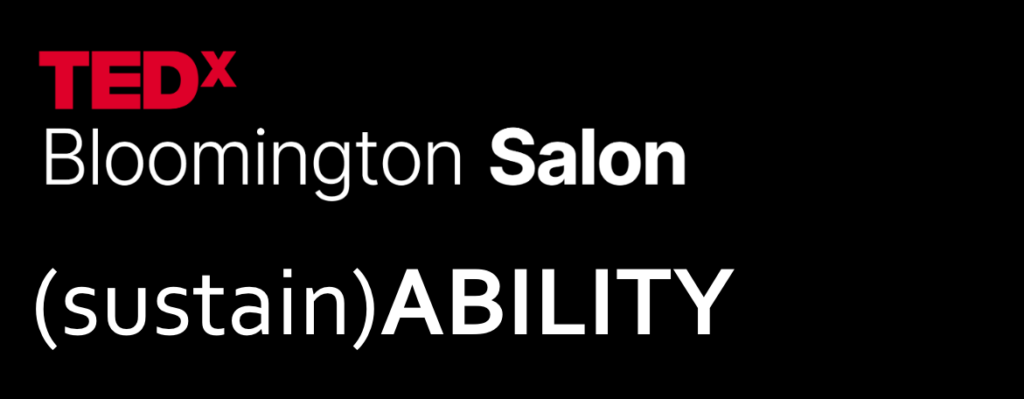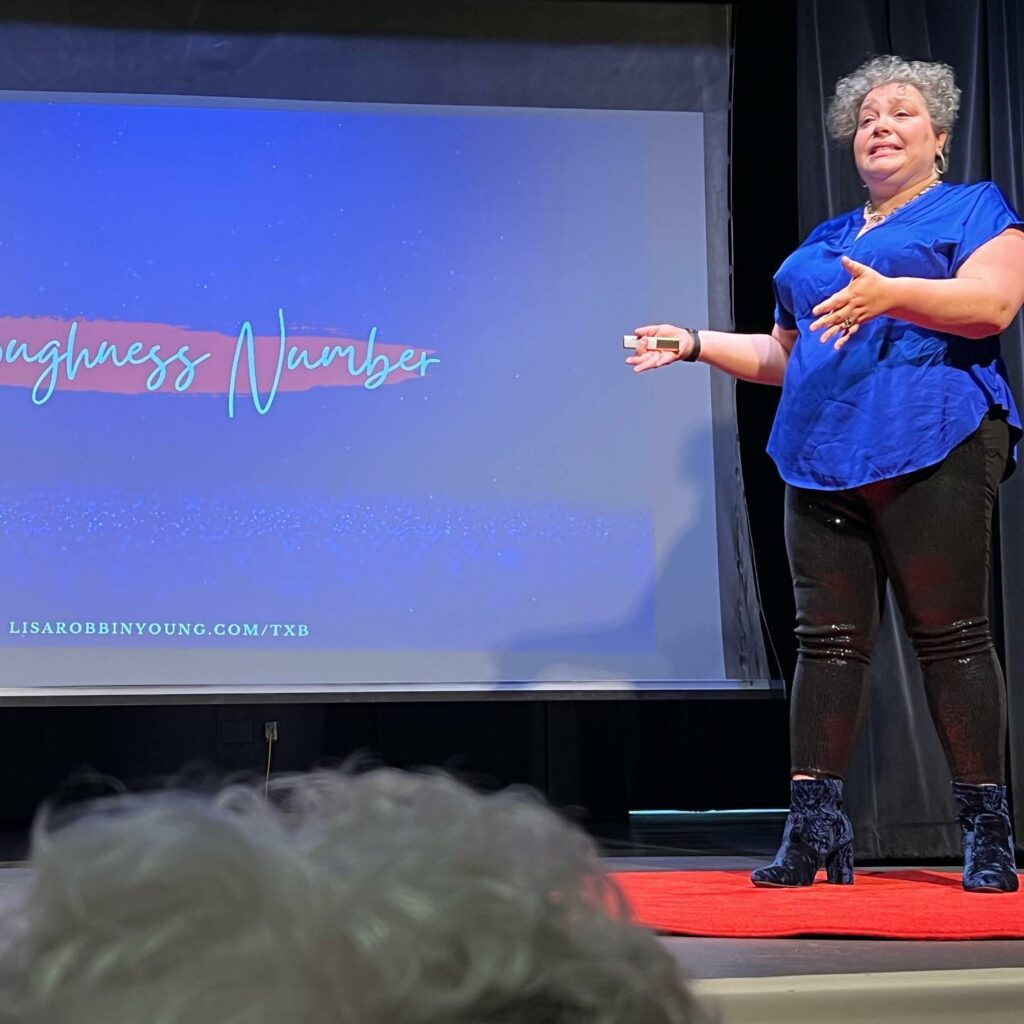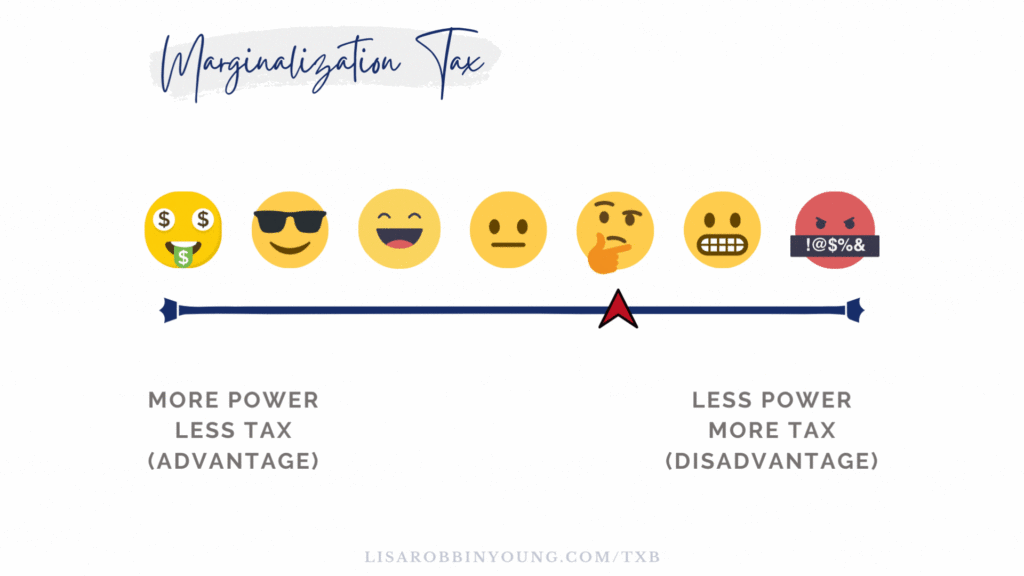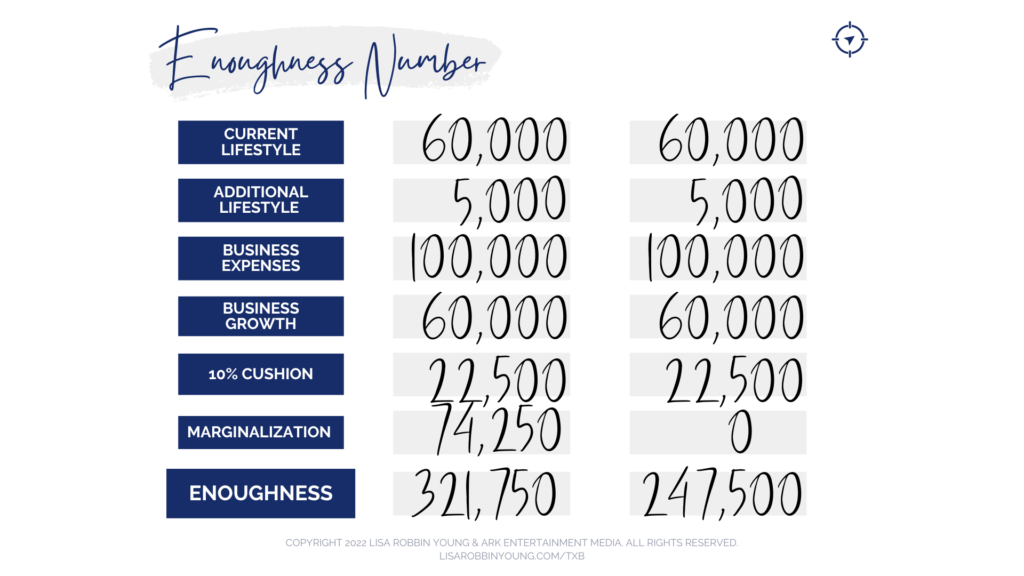At the end of March, I had the honor of speaking at the TEDxBloomington Salon and it was amazing.
Salons are generally smaller scale TED-style events that are locally curated, like any TEDx event. Unlike a larger, full-day event where the talks can range pretty widely, Salons are generally on a more focused topic. Our topic was (sustain)ABILITY.

The theme still lends itself to some pretty wide-ranging topics, including a sonnet on sustainability, the importance of preserving indigenous language for future generations (and the tech to make it accessible to everyone), how kindness and generosity can sustain us, the 3 steps to find healing in business, and more. I look forward to sharing the talks once they're all uploaded, but for now, I can share my talk on How the Marginalization Tax impacts finding Enoughness for micro businesses. You can also access the bonus resources for my TEDx talk here.
My life is a paradox. As a business coach and entrepreneur, I rely on Capitalism to keep food on the table. And I help my clients to do the same. But as a human being, I also rail against what it seems like Capitalism has become: a money-grubbing, soul-crushing free-for-all for the wealthy elite that would rather leave our big blue marble than invest in healing, protecting, and sustaining it.
About 40% of my clients are multiply marginalized, many with a chronic illness, disability, or other capacity-limiting constraints that have essentially forced them to leave traditional employment and go out on their own because it works for how they're built. Forced, because capitalism asks more of us than we can consistently give, and no one feels this quite as much as the marginalized people of the world.
Entrepreneurship then, becomes a way for them to "leverage" the capacity they DO have - but not everyone is equipped to meet the challenges of entrepreneurship.
The incessant invitation to grow for growth's sake is a siren's song that hypnotizes entrepreneurs into the trap of adding one more zero to our revenue… and then another… and then another. But that "MORE" doesn't include room for things like more rest, more play, more ease - unless you hustle your face off first. There's this persistent myth that if you just work hard enough long enough and do your best, you'll make it to that "some day" where you can retire in style.
But Capitalism asks for more than many of us can give. And it has a bad habit of moving the goal posts on us.

With so many companies shooting for the moon - both literally and figuratively, this incessant drive for "More" isn't a sustainable path. How do we find the sustainable path in business? We strive for Enoughness instead.
When we look to nature, a cactus can thrive on very little water and a lot of sun. That is Enoughness for the cactus. If you flood the desert, the cactus rots. If you take away the sun, the cactus starves.
So Enoughness looks different in different situations.
For the folks that I work with, Enoughness is a result of building a business that works for their unique situation.
They are not corporate behemoths. They are parents, artists, travelers, authors, healers, activists, and more. They want a living wage that allows them to retire a spouse or provide for their families, and be able to enjoy the fruits of their labors - even when Capitalism tries to ask more of them than they can give on their own.

For years, I've taught what I call your Enoughness Number. It's essentially the revenue your business needs to bring in on an annual basis in order to have an experience of Enoughness. Not excessive, but appropriate. Not just subsisting, like so many marginalized folks do, but thriving.
But then one of my non-normative clients pointed out that I had not taken into account the additional resources required to navigate a world that asks more of you than you can give. We dubbed this added cost The Marginalization Tax.
At that time I was still under the spell of meritocracy. Just work harder. Keep working, and eventually you'll get there…. however long THAT is. I had always been able to keep working… until the day I needed back surgery. For eleven days I was unable to walk, stand, or otherwise move my body without substantial pain and significant help.
I was lucky I had help at home and owned my own business. If I'd been in a traditional job, I probably would have been fired or forced to use all my time off. And then where would I be for the rest of the year?
This tax is a spectrum of disadvantage based on a number of things like skin color, religion, gender expression, geography, age, body shape, economic status, social status, and basically any circumstance where there's a power imbalance that puts one group of people at an advantage to the detriment of others.

For example (and this isn't exhaustive, but you'll get the idea): I'm a cis, straight, neurodivergent, mixed-race, black woman that presents as white and able-bodied. I'm almost 50 and my body shape is not the socially accepted norm. I have a mix of privilege and disadvantage that impacts the resources I need. The more resources I need, the greater the marginalization tax I pay to participate in this world.
So let's look at what Enoughness looks like both with and without the Marginalization Tax applied so you can see how this works.
First, what are your total living expenses? Let's say $60k
Now add to that your growth. Maybe you've got a nice-to-have or a want that you'd like to see happen in the next year. That's your take-home pay requirement.
If you're a business owner, on top of your take home pay, what are the other "living expenses" of your business?
Then add your business growth to that. Maybe you want to launch a new offer and need to invest in infrastructure or support. Put it in your total.
Now add all that up and add a 10% cushion for unplanned surprises. They happen.
That's already a large number for a small business.
But, now we add the Marginalization Tax.
Based on where you fall on the spectrum, this could be anywhere from zero to as much as 50% of the total. Think that's steep? According to a 2021 report from the national women's law center, black women make a million dollars less over their career than white men. That's 37% less. That is the Marginalization Tax in action.

So we total this all up and there it is - one Enoughness Number that's drastically different than it would be if you didn't have to pay this tax.
Unlike the taxes you pay to your government each year, the bill for the Marginalization Tax comes due each day. This weekend my husband bought some cookies for $4. But I can't eat those cookies because some of the ingredients will hurt me. If I wanted to have a comparable amount of cookies that I can eat, I'd have to pay nearly 3 times as much - or I could spend just a few dollars more for all the ingredients and make them myself. Which would take an additional 45 minutes out of my day.
He can just open a package of cookies and go to town! The Marginalization Tax means I pay significantly more either in time or money - resources I may or may not have - just to enjoy a cookie.
Now you might say, "But Lisa, that's a cookie. A treat. You don't NEED a cookie. You can live without a cookie."
Yes, but why should I have to settle for less just because my body is built differently than yours?
But, let's say you're right and look at another case: One of my clients applied for medical disability long before we started working together. She had a profitable business that she'd built around her chronic illness which was so severe and variable that she never knew what her capacity to work would be like from one day to the next. Once she got approved for disability, she shut it all down. She said to me, "I can't jeopardize my disability payments. What if I go off disability and then my business has a down year? I'll have to re-apply and go through all of this all over again - and I might not survive!"
I don't blame her for wanting to protect herself and know that she can survive in a world that makes it hard for her to just exist. I blame the system where the deck is stacked against some of us and not others. That is the impact of the Marginalization Tax.
Everyone should be able to experience enoughness - a fully belly, a warm bed, and the safety of knowing they have what they need to thrive. There's certainly plenty on this planet to make it possible. But the playing field isn't level. What's worse, Capitalism keeps moving the goal posts.
But I believe that the best way to change a system is from the inside. That's why I'm a business owner. That's why I help other business owners - who aren't trying to hustle their face off to be a squijillionaire. They just want to find the balance that allows them to be paid well, within their capacity constraints, and have the time and energy to enjoy the fruits of their labors.
We don't need more rockets into space. We need more business owners striving for Enoughness for everyone.
When we have Enoughness it's… well, it's enough.
Like I said, it's a paradox.
I don't know a single entrepreneur that didn't start their business with some type of do-it-yourself (DIY) approach. Most of us begin with more time than money, and it makes sense to capitalize on that resource. In fact, I tell would-be clients all the time that the less money you have, the more you need to rely on "other resources" - friends, colleagues, connections, skill-sets, and other means of getting the job done without cash. In the direct sales world, I see a LOT of new consultants relying on family and friends to keep their business afloat (if that's your problem, you can fix it with a little Direct Sales 101).
For other entrepreneurs we often get a little too good at doing everything ourselves, and that creates a problem.
 That's the point where income and time are roughly equivalent. It's not generally a lingering point, because responsibilities typically rise in correlation to our income. I'm not sure I agree with Upamanyu Chatterjee when he said, "the more money you have, the more hassles," but you get the idea. When things are roughly equivalent, we have to get ruthlessly honest about where we're investing (or spending) our time and money. Eventually, though, things ease up and we once again have either more time or more money.
That's the point where income and time are roughly equivalent. It's not generally a lingering point, because responsibilities typically rise in correlation to our income. I'm not sure I agree with Upamanyu Chatterjee when he said, "the more money you have, the more hassles," but you get the idea. When things are roughly equivalent, we have to get ruthlessly honest about where we're investing (or spending) our time and money. Eventually, though, things ease up and we once again have either more time or more money.
Once we have more money than time, it makes sense to start liberating our time with some of our money. Yet, in the last couple of years, I've noticed that people are killing themselves (some quite literally) trying to do too much. I've mentioned Jon Morrow's story before, but his is not an uncommon tale. When the financial meltdown started rippling through my client's lives, I saw many folks tightening belts and even going dark to "ride out" the economic storm. Yet, history tells us that the companies that fare best are the ones that keep showing up and keep sharing their message even during hard times.
So how can you tell if DIY is still the way to go? There are several questions that bear exploring:
You've probably heard the old saw "everyone's a genius in a bull market" - right? Essentially, anyone with a website could slap up a paypal link and sell their stuff like hotcakes during the earliest days of this century. There were info product "gurus" hawking their schlock for $997 - and it was a pdf copy of a 3rd generation photocopy of a 75 page "report" that was poorly edited, and an MP3 of said guru reading the PDF aloud (I'm not joking). There might have been a few gems in there, but you had to dig through so much crap that it almost wasn't worth your time. The prevailing logic at the time was that if one gem could turn your business around, then who cares if it looks like crap? That was the advent of the "fail fast and fail often/good is good enough" mentality that swept the internet.
The problem was that it wasn't even good, let alone good enough. Stuff like that doesn't pass muster anymore. The bar continues to rise. Videos I filmed three years ago don't measure up to the new HD footage I can shoot with my webcam (my WEBCAM, people!). If there's more sizzle than steak, word gets out, and people stop buying. So if you've got inferior offers, it's no wonder your business is killing you. Maybe you need to invest in a team that will turn your offer into something people actually want to buy - or invest in a few beta testers to get feedback before you launch. Either get help or get out of the offering.
I truly believe you can make a living doing what you love (and in many cases a VERY GOOD living). If a grown-ass man can make money on youtube unboxing and talking about Transformers or doing video game walk-throughs, then I have no doubt in my mind there's an audience for whatever you love doing. But you can't offer crap or people won't keep showing up.
When responsibilities rise to meet income, many entrepreneurs forget about profit until the end of the year. They see profit as an event (income minus expenses, right? WRONG.) They just keep watching the dollar bills roll in... until they stop rolling in. Then they look at their business, start cutting costs, and scrambling to "stay afloat" - when they're already sunk.
You need a profit plan, and you need to follow that plan during the feast and the inevitable famine. Business, like so many things, is cyclical. If you're overspending when money is abundant, you'll be in the hole faster than Alice and the White Rabbit once the money dries up.
Look at more than just your income and outgo. Consider your long-term growth plans. No business can continue to grow indefinitely. Tastes change, markets change, and entrepreneurs have to be willing to pivot, shift, and serve their markets in meaningful ways. A profitable business today may not be profitable in future years (Blockbuster Video, anyone?), and a smart business owner keeps pace with the changes. If that takes up too much of your time, then a coach, an accountant, or another financial professional can help you keep your finger on the pulse of your business.
This is where it all comes down. You can work like a dog and have a profitable business, but have no life to speak of. Likewise, if you're constantly "re-investing" into the company, then you're not creating something sustainable. You're blue-balling your business (yes, I said it) - stringing it along and keeping it from really performing.
I had a client that owned a screen-printing company. The company was recognized for doing great work and the employees liked working there. My client was an investor, he didn't work in the business. His good friend was the owner, and wasn't particularly responsible with the income. So my client had stepped in as an "investor" to make sure payroll would be met on a consistent basis. Year after year my client plowed money into the company to keep it afloat, but when we looked at the books, the company wasn't sustaining itself. It wasn't profitable, but he didn't mind plowing the money into the company because it kept his friends in jobs. I told him he was blue-balling the company and that they needed to sit down and get real about their revenue plan. I told him he needed to have this conversation with his friend sooner, rather than later, because the company wasn't really a business!
He told me he didn't have time to have that conversation because he was busy with his own job (where all the "investment " money was coming from). Plus, he didn't want to "get into it" with his buddy. So the company hobbled along for a few more years before his buddy finally bailed on the business. Now, he's got a solid business manager in there running things. Hopefully, he'll be able to turn the ship around and create a profitable, sustainable business.
You can pump all your time or all your money back into your venture, but that doesn't mean you have a business. It's certainly not sustainable. If you can't walk away from your business to practice some self-care, or take some time to "just be" then something's amiss.
If your business can't run for a time without you, then you're the problem, not the solution. (Tweet this)
Hire someone to look at the numbers and give you some ruthless honesty. Give yourself permission to get support in creating or delivering your offering. Maybe you're lousy at writing sales copy - get a copywriter. Maybe your training style doesn't resonate with your team, hire a pro. Don't force yourself to be everything to your company, or your company can't survive without you. The day you get sick (or worse) is the day the company goes under. That's not a profitable sustainable business. That's just crazypants.
How have you set yourself up for success? What are you doing to ensure that you're not the bottleneck in your business? Share what's working for you in the comments below so we can all learn from one another.